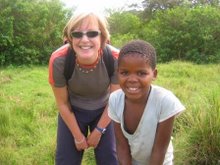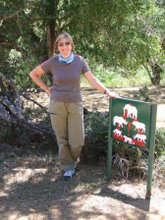Another pretty early start, not helped by trying to pack a pile of wet laundry! At least today's dawned fine, and windy so our tent has a chance to dry off.
We plan to get to Mbeya today - not so far away, but things are always difficult to time when a border's involved. We walk down the road a km or so to the bus stop, and find one waiting for us - a very good sign indeed. It's only about 90km to the border and we are there in just over an hour. The paperwork is straightforward enough when leaving though the Malawian officials were very interested in how much money we'd spent (bugger all!), and our occupations and employers. A bit more effort is usually required when entering a country and Tanzania is no exception. It's also the first time we've had to buy a visa in a while - and at $US50 each, it's not cheap, but it is for 3 months and allows multiple entries into Tanzania from its East Africa neighbours (Kenya & Uganda). We have now officially left Southern Africa, and it feels like it. Tanzania is hilly and green, and at a high enough altitude to grow tea and coffee. The views from our minibus window are spectacular - craggy hills, terraced fields and lots of people. We are seeing larger villages than we have for a long time - Botswana, Malawi and Zambia were full of small settlements, quite different to here. For some reason our minibus stops at an indeterminate point en route to Mbeya and we are all sold onto a larger bus. It doesn't matter to us much, but it's just another slightly quirky thing about travelling here. We slowly (which I think is good) make our way into town. It's raining really heavily now, and has actually got quite cold. I'm a bit worried that I'm beginning to acclimatise to hot tropical temperatures, and find anything below 20 a bit hard to tolerate.
Mbeya, when we finally get there, seems to have little to recommend it, apart from the countryside around it. It's busy, has the first professional beggars we've seen since South Africa, and seems just a bit edgy and uncomfortable. It is a city of tailors - men sitting at old fashioned sewing machines on shop verandahs.
We are duly snaffled at the bus depot and taken over the road to a typical hotel with an unpronounceable name - I need to work on my Swahili I can see.
The next morning we head out in search of a) a bank so we can get some money; b) breakfast; and c) the train station so we can book our tickets to Dar (that's how us seasoned travellers refer to Dar es Salaam!!). All accomplished relatively easily - it's chapatis and eggs for brekky, so our diet seems about to change as well; we have left behind the world of muesli, fruit and yoghurt for good I think.
The train doesn't leave till 2.30 on Saturday, so on Saturday morning, we have arranged to visit a tea plantation. We are met by our "guide" at 6.30am (our first mistake...) put on a local bus and then spend the next two hours retracing the road towards the Malawi border, with the weather deteriorating as we drive up into the hills. There's a one hour stop for no particular reason along the way (the perfect opportunity to eat more chapatis and drink chai), and then we are dropped off at a plantation and spend an hour or so walking around it in the rain. This is fun (not). Max persuades me to join a picker among the plants, and it's then that I realise why they all wear heavy plastic aprons - these tea plants are home to a particularly nasty kind of biting ant, and I spend the next half hour trying to get rid of them. Then, to finish off all this fun, it's another two hours on a crowded minibus, back to Mbeya. Just as well we got some good photos...
We plan to get to Mbeya today - not so far away, but things are always difficult to time when a border's involved. We walk down the road a km or so to the bus stop, and find one waiting for us - a very good sign indeed. It's only about 90km to the border and we are there in just over an hour. The paperwork is straightforward enough when leaving though the Malawian officials were very interested in how much money we'd spent (bugger all!), and our occupations and employers. A bit more effort is usually required when entering a country and Tanzania is no exception. It's also the first time we've had to buy a visa in a while - and at $US50 each, it's not cheap, but it is for 3 months and allows multiple entries into Tanzania from its East Africa neighbours (Kenya & Uganda). We have now officially left Southern Africa, and it feels like it. Tanzania is hilly and green, and at a high enough altitude to grow tea and coffee. The views from our minibus window are spectacular - craggy hills, terraced fields and lots of people. We are seeing larger villages than we have for a long time - Botswana, Malawi and Zambia were full of small settlements, quite different to here. For some reason our minibus stops at an indeterminate point en route to Mbeya and we are all sold onto a larger bus. It doesn't matter to us much, but it's just another slightly quirky thing about travelling here. We slowly (which I think is good) make our way into town. It's raining really heavily now, and has actually got quite cold. I'm a bit worried that I'm beginning to acclimatise to hot tropical temperatures, and find anything below 20 a bit hard to tolerate.
Mbeya, when we finally get there, seems to have little to recommend it, apart from the countryside around it. It's busy, has the first professional beggars we've seen since South Africa, and seems just a bit edgy and uncomfortable. It is a city of tailors - men sitting at old fashioned sewing machines on shop verandahs.
We are duly snaffled at the bus depot and taken over the road to a typical hotel with an unpronounceable name - I need to work on my Swahili I can see.
The next morning we head out in search of a) a bank so we can get some money; b) breakfast; and c) the train station so we can book our tickets to Dar (that's how us seasoned travellers refer to Dar es Salaam!!). All accomplished relatively easily - it's chapatis and eggs for brekky, so our diet seems about to change as well; we have left behind the world of muesli, fruit and yoghurt for good I think.
The train doesn't leave till 2.30 on Saturday, so on Saturday morning, we have arranged to visit a tea plantation. We are met by our "guide" at 6.30am (our first mistake...) put on a local bus and then spend the next two hours retracing the road towards the Malawi border, with the weather deteriorating as we drive up into the hills. There's a one hour stop for no particular reason along the way (the perfect opportunity to eat more chapatis and drink chai), and then we are dropped off at a plantation and spend an hour or so walking around it in the rain. This is fun (not). Max persuades me to join a picker among the plants, and it's then that I realise why they all wear heavy plastic aprons - these tea plants are home to a particularly nasty kind of biting ant, and I spend the next half hour trying to get rid of them. Then, to finish off all this fun, it's another two hours on a crowded minibus, back to Mbeya. Just as well we got some good photos...
I´m neither dressed for tea picking, nor in possession of suitably nimble fingers.
Luckily the weather's improved back in town, and we head off to the station as instructed by the booking clerk, by 1pm. While the train doesn't actually arrive till about 3.45, we are assured this is virtually on time. We are booked in neighbouring compartments because of some peculiar Tazara rule that won't allow men and women to sleep together if they are strangers - this means that the other three women in my compartment are frequently visited by their menfolk, as all this rule seems to do is separate travelling families. This means we find our natural home together in the bar - and by 4.30 are happily sitting in the afternoon sunshine, drinking Safari lager, and watching the spectacular Tanzanian countryside roll by. There is a nasty moment, a big jolt, early on in the journey, and we see a large and very dead pig on the side of the line, with an angry farmer alongside. In spite of the fact that I'm on a top bunk, and have wedged myself against the wall with the Tazara-supplied rugs (just in case we hit another pig in the night), I sleep pretty well - but we get up early as the train goes through a number of national parks and game reserves in the morning. We don't see too many animals, but the scenery is now truly spectacular - there are mountain ranges, and real jungle, as well as lots of villages.

A cold beer, a slow train, and pretty countryside, bliss I´d say.
Dar, on a Sunday anyway, is pretty quiet. It reminds me of Singapore of 20 years ago, or perhaps contemporary Kathmandu - low rise, ramshackle, a bit of faded colonial charm, lots of business on the streets - but with mosques, in fact our hotel is on Mosque St - that should be quiet!! We decided to treat ourselves to a good Sunday lunch, and eat delicious curry and fruit salad, and coffee - no beer in this part of the world, we will have to wait for Zanzibar.
















